Analysis of Entrepreneurship: Squid London Business Report
VerifiedAdded on 2020/05/01
|7
|1519
|37
Report
AI Summary
This report offers an in-depth analysis of entrepreneurship, focusing on the business operations of Squid London. It begins with an introduction to entrepreneurship, defining its core concepts and the role of entrepreneurs. The report then provides an overview of Squid London, highlighting its innovative product line of color-changing rainwear and umbrellas. It explores various frameworks explaining entrepreneurial activities, including resource capital and organizational behavior. The report delves into the management functions within Squid London, such as marketing, human resource management, innovation, and finance. It also discusses the issues encountered by diverse enterprises, specifically addressing diversity and ethical considerations. Furthermore, the report examines the contribution of small businesses to national economies and analyzes the factors influencing business start-up, growth, and closure. Finally, it provides a critical analysis of organizational behavior's impact on entrepreneurial orientation and management, concluding with a list of references.

Entrepreneurship
Paraphrase This Document
Need a fresh take? Get an instant paraphrase of this document with our AI Paraphraser
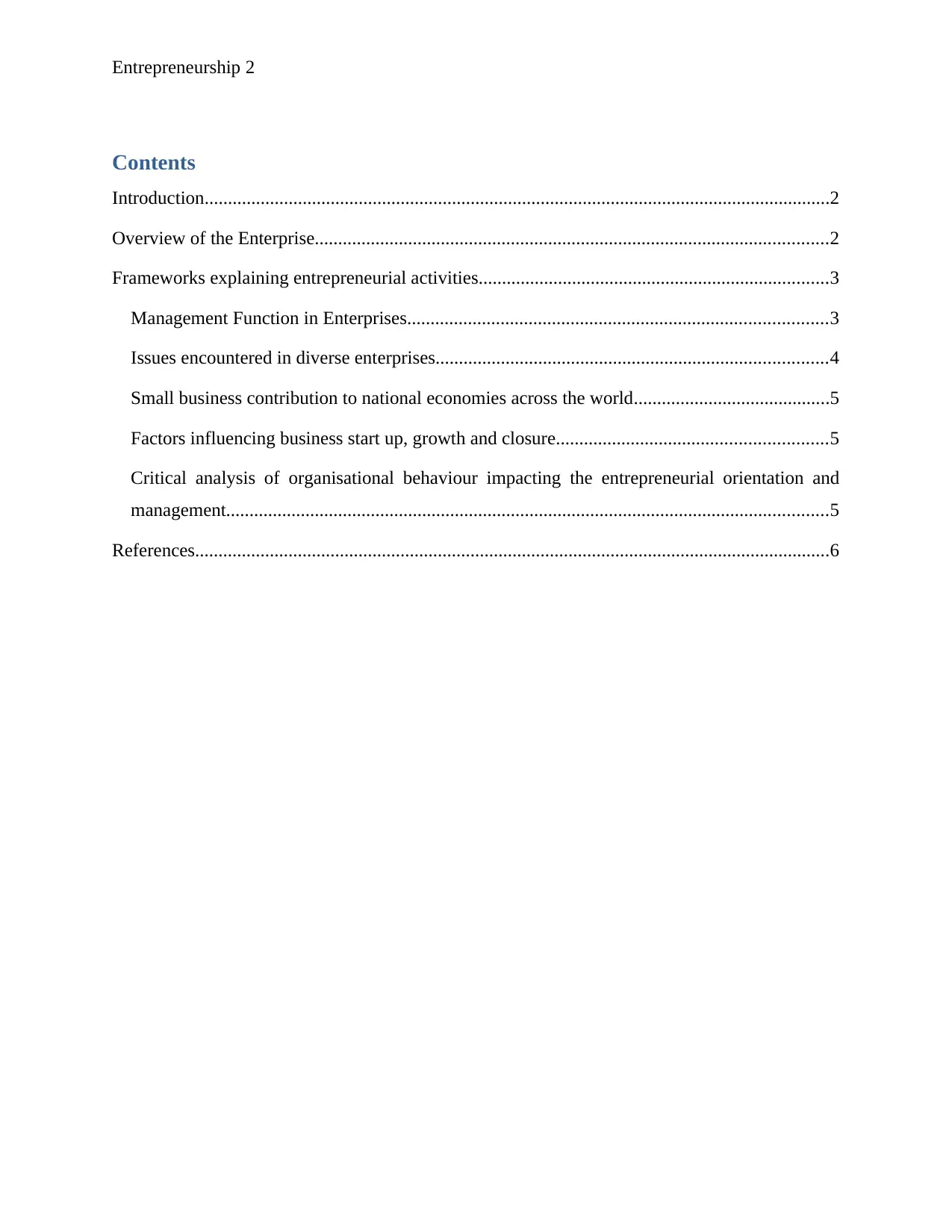
Entrepreneurship 2
Contents
Introduction......................................................................................................................................2
Overview of the Enterprise..............................................................................................................2
Frameworks explaining entrepreneurial activities...........................................................................3
Management Function in Enterprises..........................................................................................3
Issues encountered in diverse enterprises....................................................................................4
Small business contribution to national economies across the world..........................................5
Factors influencing business start up, growth and closure..........................................................5
Critical analysis of organisational behaviour impacting the entrepreneurial orientation and
management.................................................................................................................................5
References........................................................................................................................................6
Contents
Introduction......................................................................................................................................2
Overview of the Enterprise..............................................................................................................2
Frameworks explaining entrepreneurial activities...........................................................................3
Management Function in Enterprises..........................................................................................3
Issues encountered in diverse enterprises....................................................................................4
Small business contribution to national economies across the world..........................................5
Factors influencing business start up, growth and closure..........................................................5
Critical analysis of organisational behaviour impacting the entrepreneurial orientation and
management.................................................................................................................................5
References........................................................................................................................................6
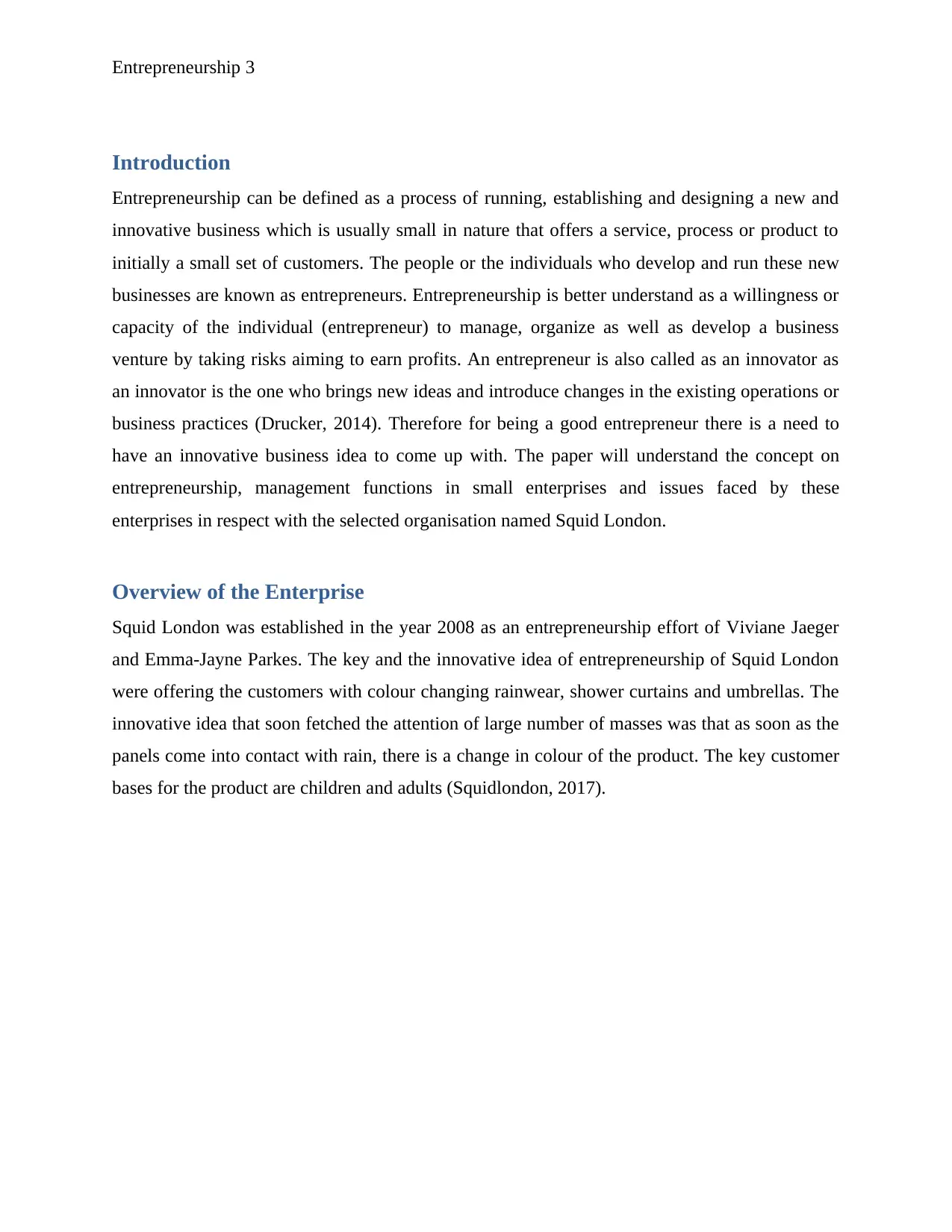
Entrepreneurship 3
Introduction
Entrepreneurship can be defined as a process of running, establishing and designing a new and
innovative business which is usually small in nature that offers a service, process or product to
initially a small set of customers. The people or the individuals who develop and run these new
businesses are known as entrepreneurs. Entrepreneurship is better understand as a willingness or
capacity of the individual (entrepreneur) to manage, organize as well as develop a business
venture by taking risks aiming to earn profits. An entrepreneur is also called as an innovator as
an innovator is the one who brings new ideas and introduce changes in the existing operations or
business practices (Drucker, 2014). Therefore for being a good entrepreneur there is a need to
have an innovative business idea to come up with. The paper will understand the concept on
entrepreneurship, management functions in small enterprises and issues faced by these
enterprises in respect with the selected organisation named Squid London.
Overview of the Enterprise
Squid London was established in the year 2008 as an entrepreneurship effort of Viviane Jaeger
and Emma-Jayne Parkes. The key and the innovative idea of entrepreneurship of Squid London
were offering the customers with colour changing rainwear, shower curtains and umbrellas. The
innovative idea that soon fetched the attention of large number of masses was that as soon as the
panels come into contact with rain, there is a change in colour of the product. The key customer
bases for the product are children and adults (Squidlondon, 2017).
Introduction
Entrepreneurship can be defined as a process of running, establishing and designing a new and
innovative business which is usually small in nature that offers a service, process or product to
initially a small set of customers. The people or the individuals who develop and run these new
businesses are known as entrepreneurs. Entrepreneurship is better understand as a willingness or
capacity of the individual (entrepreneur) to manage, organize as well as develop a business
venture by taking risks aiming to earn profits. An entrepreneur is also called as an innovator as
an innovator is the one who brings new ideas and introduce changes in the existing operations or
business practices (Drucker, 2014). Therefore for being a good entrepreneur there is a need to
have an innovative business idea to come up with. The paper will understand the concept on
entrepreneurship, management functions in small enterprises and issues faced by these
enterprises in respect with the selected organisation named Squid London.
Overview of the Enterprise
Squid London was established in the year 2008 as an entrepreneurship effort of Viviane Jaeger
and Emma-Jayne Parkes. The key and the innovative idea of entrepreneurship of Squid London
were offering the customers with colour changing rainwear, shower curtains and umbrellas. The
innovative idea that soon fetched the attention of large number of masses was that as soon as the
panels come into contact with rain, there is a change in colour of the product. The key customer
bases for the product are children and adults (Squidlondon, 2017).
⊘ This is a preview!⊘
Do you want full access?
Subscribe today to unlock all pages.

Trusted by 1+ million students worldwide
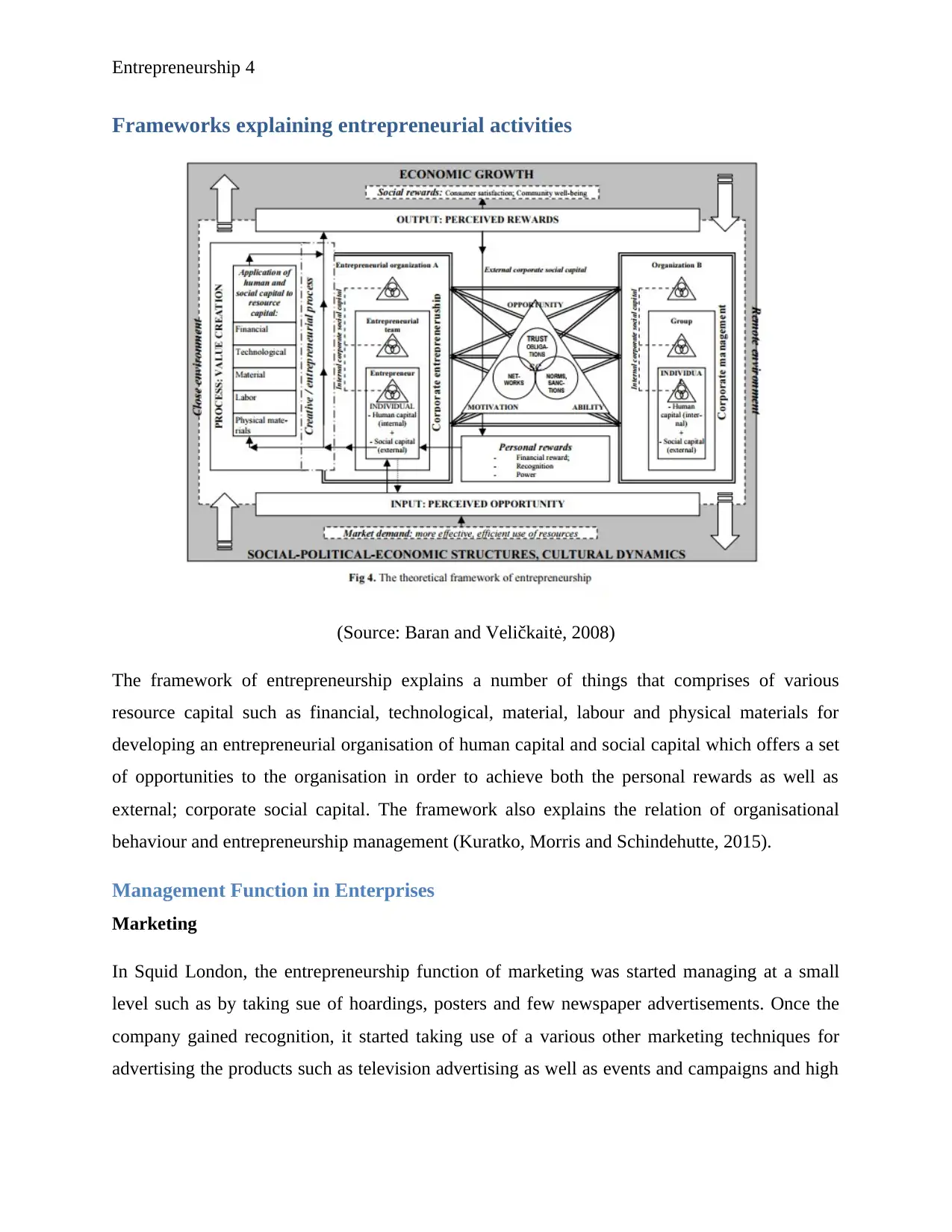
Entrepreneurship 4
Frameworks explaining entrepreneurial activities
(Source: Baran and Veličkaitė, 2008)
The framework of entrepreneurship explains a number of things that comprises of various
resource capital such as financial, technological, material, labour and physical materials for
developing an entrepreneurial organisation of human capital and social capital which offers a set
of opportunities to the organisation in order to achieve both the personal rewards as well as
external; corporate social capital. The framework also explains the relation of organisational
behaviour and entrepreneurship management (Kuratko, Morris and Schindehutte, 2015).
Management Function in Enterprises
Marketing
In Squid London, the entrepreneurship function of marketing was started managing at a small
level such as by taking sue of hoardings, posters and few newspaper advertisements. Once the
company gained recognition, it started taking use of a various other marketing techniques for
advertising the products such as television advertising as well as events and campaigns and high
Frameworks explaining entrepreneurial activities
(Source: Baran and Veličkaitė, 2008)
The framework of entrepreneurship explains a number of things that comprises of various
resource capital such as financial, technological, material, labour and physical materials for
developing an entrepreneurial organisation of human capital and social capital which offers a set
of opportunities to the organisation in order to achieve both the personal rewards as well as
external; corporate social capital. The framework also explains the relation of organisational
behaviour and entrepreneurship management (Kuratko, Morris and Schindehutte, 2015).
Management Function in Enterprises
Marketing
In Squid London, the entrepreneurship function of marketing was started managing at a small
level such as by taking sue of hoardings, posters and few newspaper advertisements. Once the
company gained recognition, it started taking use of a various other marketing techniques for
advertising the products such as television advertising as well as events and campaigns and high
Paraphrase This Document
Need a fresh take? Get an instant paraphrase of this document with our AI Paraphraser
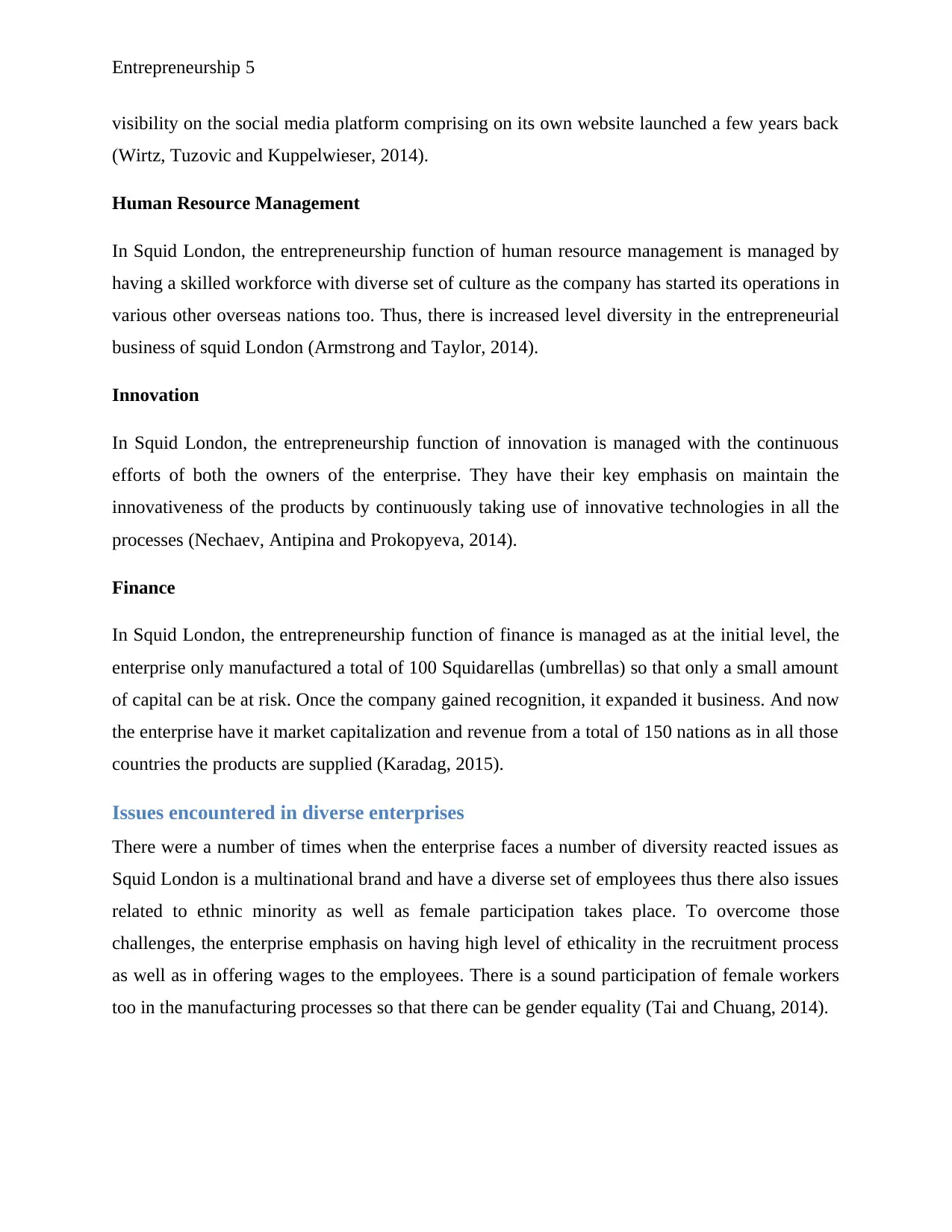
Entrepreneurship 5
visibility on the social media platform comprising on its own website launched a few years back
(Wirtz, Tuzovic and Kuppelwieser, 2014).
Human Resource Management
In Squid London, the entrepreneurship function of human resource management is managed by
having a skilled workforce with diverse set of culture as the company has started its operations in
various other overseas nations too. Thus, there is increased level diversity in the entrepreneurial
business of squid London (Armstrong and Taylor, 2014).
Innovation
In Squid London, the entrepreneurship function of innovation is managed with the continuous
efforts of both the owners of the enterprise. They have their key emphasis on maintain the
innovativeness of the products by continuously taking use of innovative technologies in all the
processes (Nechaev, Antipina and Prokopyeva, 2014).
Finance
In Squid London, the entrepreneurship function of finance is managed as at the initial level, the
enterprise only manufactured a total of 100 Squidarellas (umbrellas) so that only a small amount
of capital can be at risk. Once the company gained recognition, it expanded it business. And now
the enterprise have it market capitalization and revenue from a total of 150 nations as in all those
countries the products are supplied (Karadag, 2015).
Issues encountered in diverse enterprises
There were a number of times when the enterprise faces a number of diversity reacted issues as
Squid London is a multinational brand and have a diverse set of employees thus there also issues
related to ethnic minority as well as female participation takes place. To overcome those
challenges, the enterprise emphasis on having high level of ethicality in the recruitment process
as well as in offering wages to the employees. There is a sound participation of female workers
too in the manufacturing processes so that there can be gender equality (Tai and Chuang, 2014).
visibility on the social media platform comprising on its own website launched a few years back
(Wirtz, Tuzovic and Kuppelwieser, 2014).
Human Resource Management
In Squid London, the entrepreneurship function of human resource management is managed by
having a skilled workforce with diverse set of culture as the company has started its operations in
various other overseas nations too. Thus, there is increased level diversity in the entrepreneurial
business of squid London (Armstrong and Taylor, 2014).
Innovation
In Squid London, the entrepreneurship function of innovation is managed with the continuous
efforts of both the owners of the enterprise. They have their key emphasis on maintain the
innovativeness of the products by continuously taking use of innovative technologies in all the
processes (Nechaev, Antipina and Prokopyeva, 2014).
Finance
In Squid London, the entrepreneurship function of finance is managed as at the initial level, the
enterprise only manufactured a total of 100 Squidarellas (umbrellas) so that only a small amount
of capital can be at risk. Once the company gained recognition, it expanded it business. And now
the enterprise have it market capitalization and revenue from a total of 150 nations as in all those
countries the products are supplied (Karadag, 2015).
Issues encountered in diverse enterprises
There were a number of times when the enterprise faces a number of diversity reacted issues as
Squid London is a multinational brand and have a diverse set of employees thus there also issues
related to ethnic minority as well as female participation takes place. To overcome those
challenges, the enterprise emphasis on having high level of ethicality in the recruitment process
as well as in offering wages to the employees. There is a sound participation of female workers
too in the manufacturing processes so that there can be gender equality (Tai and Chuang, 2014).
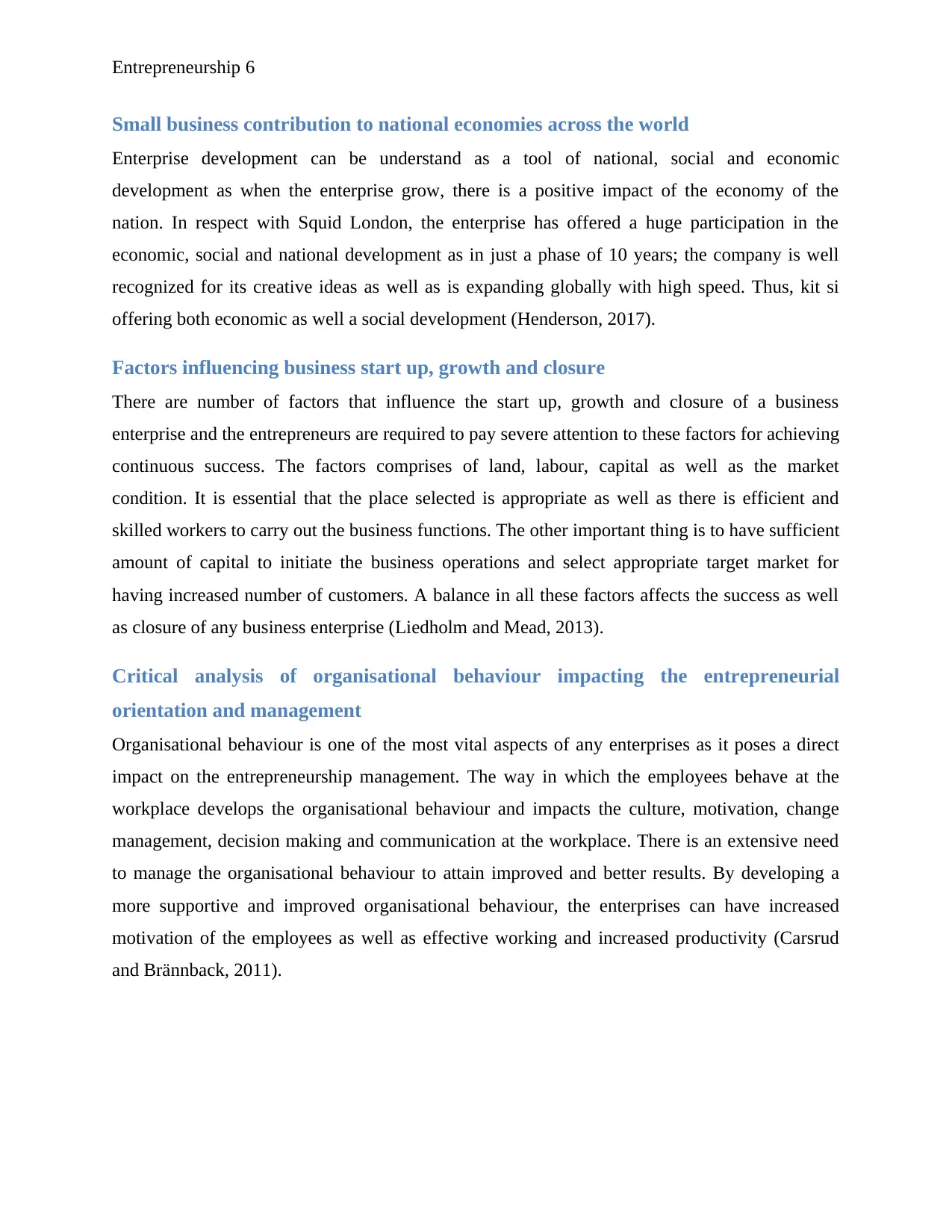
Entrepreneurship 6
Small business contribution to national economies across the world
Enterprise development can be understand as a tool of national, social and economic
development as when the enterprise grow, there is a positive impact of the economy of the
nation. In respect with Squid London, the enterprise has offered a huge participation in the
economic, social and national development as in just a phase of 10 years; the company is well
recognized for its creative ideas as well as is expanding globally with high speed. Thus, kit si
offering both economic as well a social development (Henderson, 2017).
Factors influencing business start up, growth and closure
There are number of factors that influence the start up, growth and closure of a business
enterprise and the entrepreneurs are required to pay severe attention to these factors for achieving
continuous success. The factors comprises of land, labour, capital as well as the market
condition. It is essential that the place selected is appropriate as well as there is efficient and
skilled workers to carry out the business functions. The other important thing is to have sufficient
amount of capital to initiate the business operations and select appropriate target market for
having increased number of customers. A balance in all these factors affects the success as well
as closure of any business enterprise (Liedholm and Mead, 2013).
Critical analysis of organisational behaviour impacting the entrepreneurial
orientation and management
Organisational behaviour is one of the most vital aspects of any enterprises as it poses a direct
impact on the entrepreneurship management. The way in which the employees behave at the
workplace develops the organisational behaviour and impacts the culture, motivation, change
management, decision making and communication at the workplace. There is an extensive need
to manage the organisational behaviour to attain improved and better results. By developing a
more supportive and improved organisational behaviour, the enterprises can have increased
motivation of the employees as well as effective working and increased productivity (Carsrud
and Brännback, 2011).
Small business contribution to national economies across the world
Enterprise development can be understand as a tool of national, social and economic
development as when the enterprise grow, there is a positive impact of the economy of the
nation. In respect with Squid London, the enterprise has offered a huge participation in the
economic, social and national development as in just a phase of 10 years; the company is well
recognized for its creative ideas as well as is expanding globally with high speed. Thus, kit si
offering both economic as well a social development (Henderson, 2017).
Factors influencing business start up, growth and closure
There are number of factors that influence the start up, growth and closure of a business
enterprise and the entrepreneurs are required to pay severe attention to these factors for achieving
continuous success. The factors comprises of land, labour, capital as well as the market
condition. It is essential that the place selected is appropriate as well as there is efficient and
skilled workers to carry out the business functions. The other important thing is to have sufficient
amount of capital to initiate the business operations and select appropriate target market for
having increased number of customers. A balance in all these factors affects the success as well
as closure of any business enterprise (Liedholm and Mead, 2013).
Critical analysis of organisational behaviour impacting the entrepreneurial
orientation and management
Organisational behaviour is one of the most vital aspects of any enterprises as it poses a direct
impact on the entrepreneurship management. The way in which the employees behave at the
workplace develops the organisational behaviour and impacts the culture, motivation, change
management, decision making and communication at the workplace. There is an extensive need
to manage the organisational behaviour to attain improved and better results. By developing a
more supportive and improved organisational behaviour, the enterprises can have increased
motivation of the employees as well as effective working and increased productivity (Carsrud
and Brännback, 2011).
⊘ This is a preview!⊘
Do you want full access?
Subscribe today to unlock all pages.

Trusted by 1+ million students worldwide
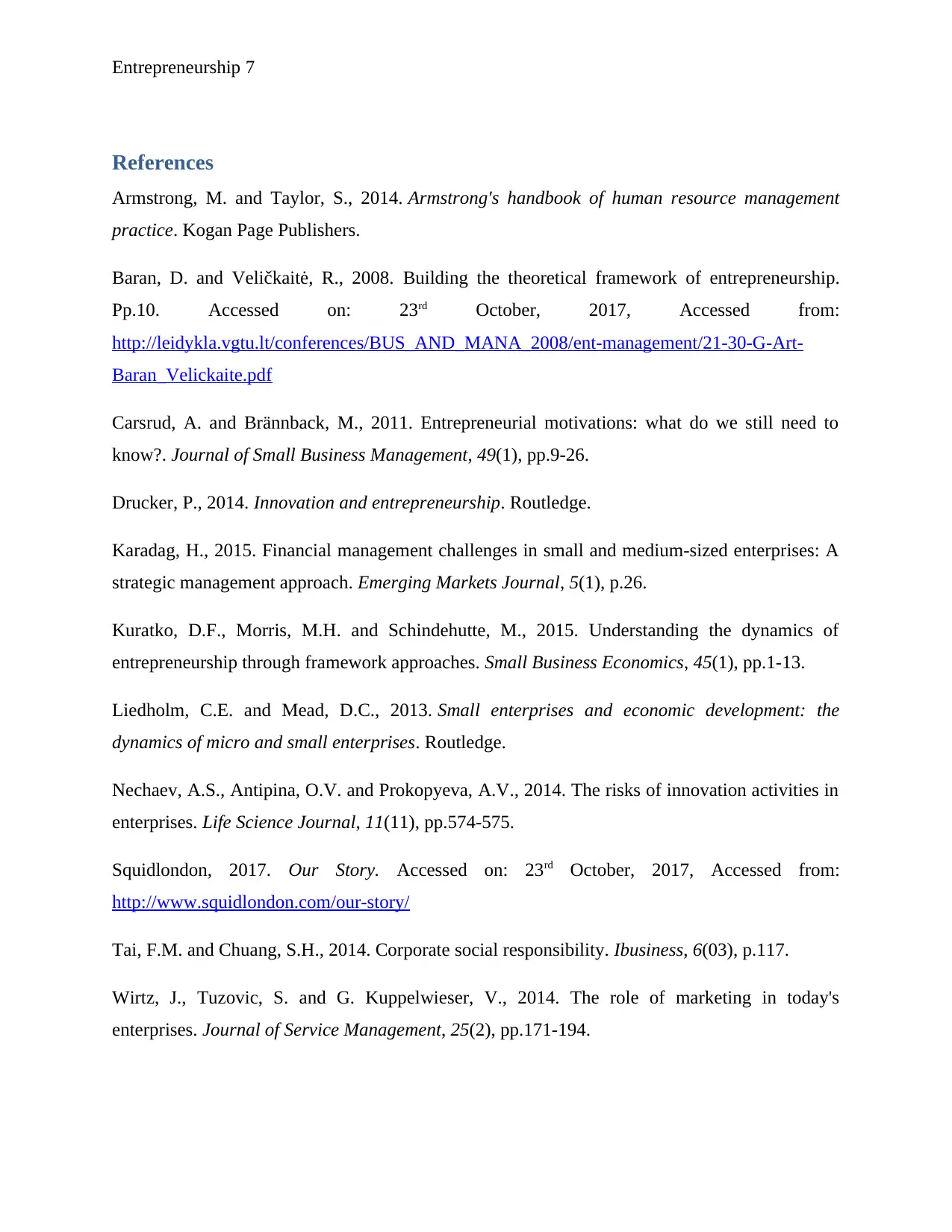
Entrepreneurship 7
References
Armstrong, M. and Taylor, S., 2014. Armstrong's handbook of human resource management
practice. Kogan Page Publishers.
Baran, D. and Veličkaitė, R., 2008. Building the theoretical framework of entrepreneurship.
Pp.10. Accessed on: 23rd October, 2017, Accessed from:
http://leidykla.vgtu.lt/conferences/BUS_AND_MANA_2008/ent-management/21-30-G-Art-
Baran_Velickaite.pdf
Carsrud, A. and Brännback, M., 2011. Entrepreneurial motivations: what do we still need to
know?. Journal of Small Business Management, 49(1), pp.9-26.
Drucker, P., 2014. Innovation and entrepreneurship. Routledge.
Karadag, H., 2015. Financial management challenges in small and medium-sized enterprises: A
strategic management approach. Emerging Markets Journal, 5(1), p.26.
Kuratko, D.F., Morris, M.H. and Schindehutte, M., 2015. Understanding the dynamics of
entrepreneurship through framework approaches. Small Business Economics, 45(1), pp.1-13.
Liedholm, C.E. and Mead, D.C., 2013. Small enterprises and economic development: the
dynamics of micro and small enterprises. Routledge.
Nechaev, A.S., Antipina, O.V. and Prokopyeva, A.V., 2014. The risks of innovation activities in
enterprises. Life Science Journal, 11(11), pp.574-575.
Squidlondon, 2017. Our Story. Accessed on: 23rd October, 2017, Accessed from:
http://www.squidlondon.com/our-story/
Tai, F.M. and Chuang, S.H., 2014. Corporate social responsibility. Ibusiness, 6(03), p.117.
Wirtz, J., Tuzovic, S. and G. Kuppelwieser, V., 2014. The role of marketing in today's
enterprises. Journal of Service Management, 25(2), pp.171-194.
References
Armstrong, M. and Taylor, S., 2014. Armstrong's handbook of human resource management
practice. Kogan Page Publishers.
Baran, D. and Veličkaitė, R., 2008. Building the theoretical framework of entrepreneurship.
Pp.10. Accessed on: 23rd October, 2017, Accessed from:
http://leidykla.vgtu.lt/conferences/BUS_AND_MANA_2008/ent-management/21-30-G-Art-
Baran_Velickaite.pdf
Carsrud, A. and Brännback, M., 2011. Entrepreneurial motivations: what do we still need to
know?. Journal of Small Business Management, 49(1), pp.9-26.
Drucker, P., 2014. Innovation and entrepreneurship. Routledge.
Karadag, H., 2015. Financial management challenges in small and medium-sized enterprises: A
strategic management approach. Emerging Markets Journal, 5(1), p.26.
Kuratko, D.F., Morris, M.H. and Schindehutte, M., 2015. Understanding the dynamics of
entrepreneurship through framework approaches. Small Business Economics, 45(1), pp.1-13.
Liedholm, C.E. and Mead, D.C., 2013. Small enterprises and economic development: the
dynamics of micro and small enterprises. Routledge.
Nechaev, A.S., Antipina, O.V. and Prokopyeva, A.V., 2014. The risks of innovation activities in
enterprises. Life Science Journal, 11(11), pp.574-575.
Squidlondon, 2017. Our Story. Accessed on: 23rd October, 2017, Accessed from:
http://www.squidlondon.com/our-story/
Tai, F.M. and Chuang, S.H., 2014. Corporate social responsibility. Ibusiness, 6(03), p.117.
Wirtz, J., Tuzovic, S. and G. Kuppelwieser, V., 2014. The role of marketing in today's
enterprises. Journal of Service Management, 25(2), pp.171-194.
1 out of 7
Related Documents
Your All-in-One AI-Powered Toolkit for Academic Success.
+13062052269
info@desklib.com
Available 24*7 on WhatsApp / Email
![[object Object]](/_next/static/media/star-bottom.7253800d.svg)
Unlock your academic potential
Copyright © 2020–2026 A2Z Services. All Rights Reserved. Developed and managed by ZUCOL.




